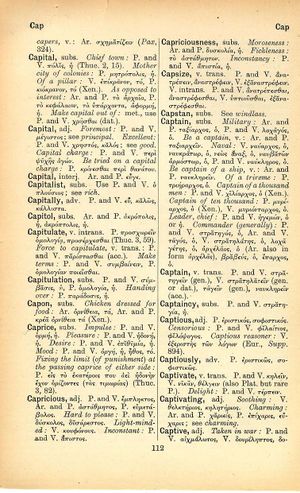capital: Difference between revisions
Ἰσχυρὸν ὄχλος ἐστίν, οὐκ ἔχει δὲ νοῦν → Plebs nempe res est valida, sed mentis carens → Des Volkes Masse hat zwar Macht, doch fehlt Vernunft
m (Text replacement - "(|thumb)\n(\|link=)" to "$1$2") |
m (Woodhouse1 replacement) |
||
| Line 1: | Line 1: | ||
{{Woodhouse1 | {{Woodhouse1 | ||
|Text=[[File:woodhouse_112.jpg|thumb|link={{filepath:woodhouse_112.jpg}}]] | |Text=[[File:woodhouse_112.jpg|thumb|link={{filepath:woodhouse_112.jpg}}]] | ||
===substantive=== | |||
[[chief town]]: [[prose|P.]] and [[verse|V.]] [[πόλις]], ἡ ([[Thucydides|Thuc.]] 2, 15). | |||
[[mother city of colonies]]: [[prose|P.]] [[μητρόπολις]], ἡ. | |||
of a [[pillar]]: [[verse|V.]] [[ἐπίκρανον]], τό, [[prose|P.]] [[κιόκρανον]], τό ([[Xenophon|Xen.]]). | |||
[[as opposed to interest]]: [[Aristophanes|Ar.]]. and [[prose|P.]] [[τὰ ἀρχαῖα]], [[prose|P.]] [[το κεφάλαιον]], [[τὰ ὑπάρχοντα]], [[ἀφορμή]], ἡ. | |||
[[make capital cut of]]: Met., use [[prose|P.]] and [[verse|V.]] [[χρῆσθαι]] (dat.). | |||
===adjective=== | |||
[[foremost]]: [[prose|P.]] and [[verse|V.]] [[μέγιστος]]; see [[principal]]. | |||
[[excellent]]: [[prose|P.]] and [[verse|V.]] [[χρηστός]], [[καλός]]; see [[good]]. | |||
[[capital charge]]: [[prose|P.]] and [[verse|V.]] [[περὶ ψυχῆς ἀγών]]. | |||
[[be tried on a capital charge]]: [[prose|P.]] [[κρίνεσθαι περὶ θανάτου]]. | |||
===interjection=== | |||
Ar. and P. [[εὖγε]]. | [[Aristophanes|Ar.]] and [[prose|P.]] [[εὖγε]]. | ||
}} | }} | ||
{{Lewis | {{Lewis | ||
Revision as of 08:51, 20 May 2020
English > Greek (Woodhouse)
substantive
chief town: P. and V. πόλις, ἡ (Thuc. 2, 15).
mother city of colonies: P. μητρόπολις, ἡ.
of a pillar: V. ἐπίκρανον, τό, P. κιόκρανον, τό (Xen.).
as opposed to interest: Ar.. and P. τὰ ἀρχαῖα, P. το κεφάλαιον, τὰ ὑπάρχοντα, ἀφορμή, ἡ.
make capital cut of: Met., use P. and V. χρῆσθαι (dat.).
adjective
foremost: P. and V. μέγιστος; see principal.
excellent: P. and V. χρηστός, καλός; see good.
capital charge: P. and V. περὶ ψυχῆς ἀγών.
be tried on a capital charge: P. κρίνεσθαι περὶ θανάτου.
interjection
Latin > English (Lewis & Short)
căpĭtal: v. capitalis.
Latin > French (Gaffiot 2016)
căpĭtăl,¹⁴ ālis, n. (capitalis),
1 crime capital : capital facere Pl. Merc. 611, commettre un crime capital ; capitalia vindicare Cic. Leg. 3, 6, punir les crimes capitaux || capital est avec inf., c’est un crime capital de : Liv. 24, 37, 9 ; Sen. Ben. 4, 38, 2 ; Curt. 8, 9, 34 ; Plin. 12, 63 ; 18, 12 ; [formules de lois] : si servus... fecerit, ei capital (esto) Dig. 47, 21, 3, 1, si un esclave a fait..., que ce soit pour lui un crime capital ( Cic. Inv. 2, 96 ) ; qui non paruerit, capital esto Cic. Leg. 2, 21, pour qui n’aura pas obéi, crime capital || căpĭtāle Tac. Agr. 2 ; Quint. 9, 2, 67 au lieu de capital
2 bandeau des prêtresses dans les sacrifices : Varro L. 5, 130 ; P. Fest. 57, 6.
Latin > German (Georges)
capital (nachaug. capitāle), ālis, n. (capitalis), I) capital (sc. linteum), ein leinenes Tuch, das die Priesterin beim Opfern um den Kopf zu tragen pflegte, Varr. LL. 5, 130. Paul. ex Fest. 57, 6. – II) (sc. facinus) das Kapitalverbrechen, Todesverbrechen, capital facere, eine Mordtat begehen, Plaut.: u. so capital admittere gladio, ICt.: capitalia audere, Liv.: capitalia vindicare, Cic.: capital est m. folg. indir. Fragesatz, nisi, si u. dgl., Cic. de legg. 2, 21; de inv. 2, 96. Iustin. 2, 7, 8: ebenso capitale fuisse, cum etc., Tac. Agr. 2, 1: capital est m. Infin., Lucil. sat. 26, 67. Liv. 24, 37, 9. Mela 1, 9, 7 (1. § 58). Curt. 8, 4 (15), 17. Suet. Cal. 24, 2: ebenso capitale est m. Infin., Quint. 9, 2, 67: u. capital exsistit (es wird zum T.) m. Infin., Val. Max. 6, 1. ext. 1: u. capital facere (es zu einem T. machen) m. Infin., Plin. 10, 62.

